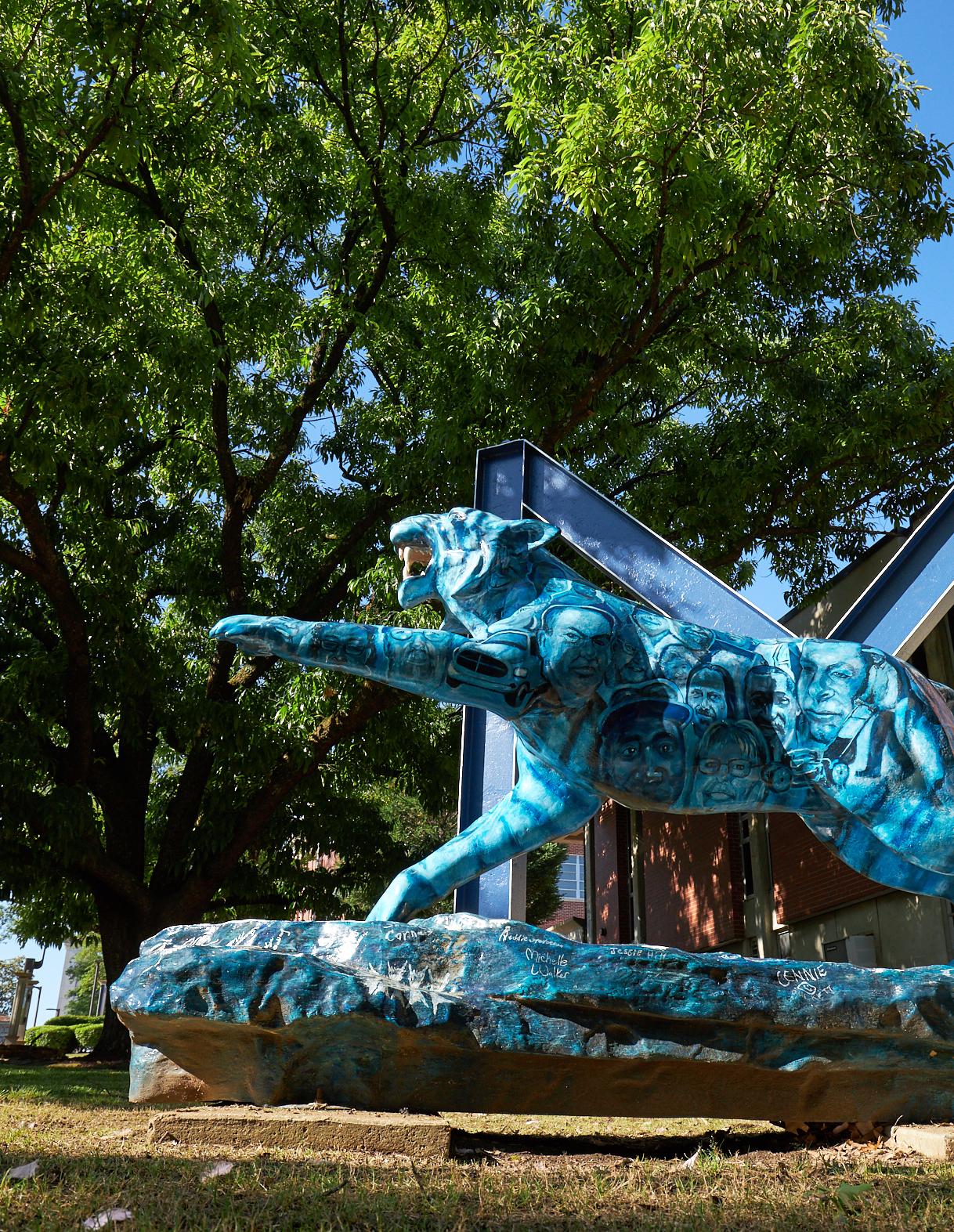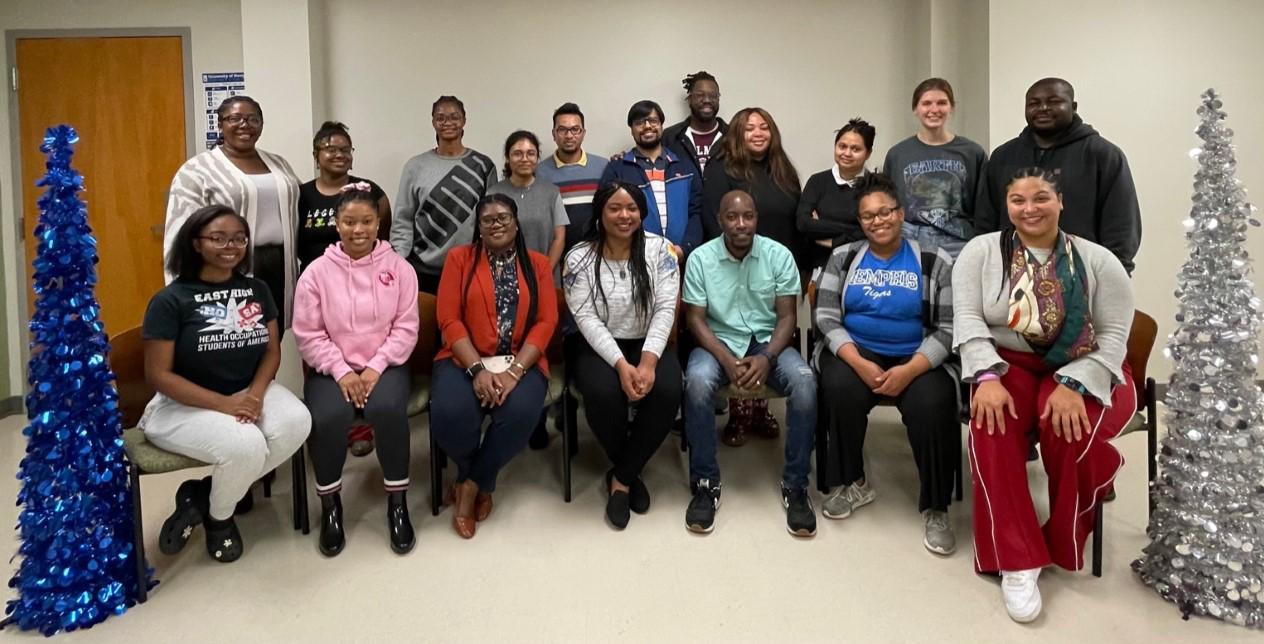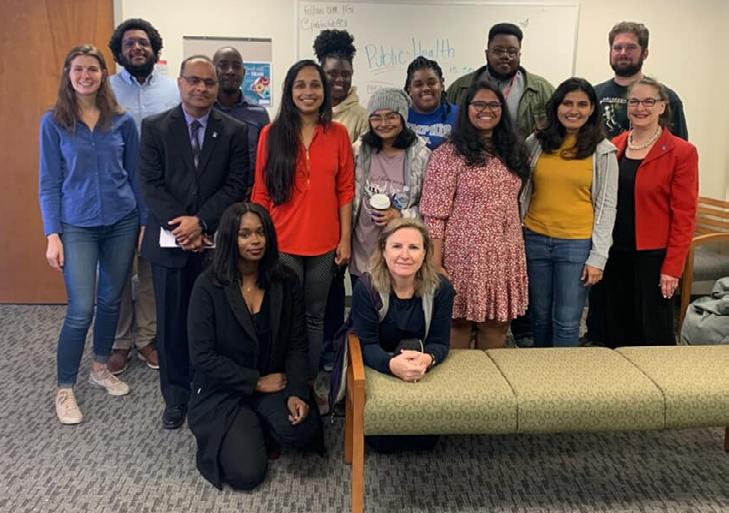
Research | Entrepreneurship | Analytics | Informatics | Management Inclusivity | Diversity | Equity | Accessibility | Sustainability Inaugural Issue #1 December 2022
PUBLIC HEALTH IDEAS REAIM
Dean
Ashish Joshi, PhD., MBBS, MPH
Communications Team
Magdalena Reilly
Ryan Wigginton
Katherine Shorter
Contact Us at: sphcommunications@memphis.edu
Follow School of Public Health:


Inaugural Issue #1 December 2022
A QUARTERLY PUBLICATION

University of Memphis
School of Public Health memphis.edu/publichealth
 University of Memphis | School of Public Health
University of Memphis | School of Public Health

Message from the Dean Why is Public Health Important? Our History SPH in Numbers Research Highlights Spotlights In the Community Student Organizations Recent Grants Awards & Recognition Events & Updates New Initiatives 4 6 8 10 12 16 22 24 28 30 32 34 CONTENTS 3 December 2022
MESSAGE FROM THE DEAN
Iarrived in Memphis on the first of August 2022 in the official capacity as the Dean of the School of Public Health at the University of Memphis. I came with the fervent desire and firm conviction to contribute positively to the community that I was going to be a part of.
Today, I am proud to share with you the inaugural issue of the University of Memphis, School of Public Health REAIM (Research, Entrepreneurship, Analytics, Informatics and Management) Public Health IDEAS Newsletter, which describes the diverse, collaborative culture of our school. We aspire to make this school a place that will be able to provide the much needed solutions to the public health challenges through its public health interventions, programs and policies. These will support community health efforts at multiple levels of participation: at the student level, faculty level and through community engagement.
This inaugural issue is aimed
to highlight some of the many activities organized by the School of Public Health. The aim of these activities is to advance public health knowledge through educational excellence and innovative and scholarly research. Additionally, to prepare a community of learners and leaders that will be able to contribute toward the improvement of the health and well-being of populations in the city of Memphis, the state of Tennessee, nationally, and around the world.
We are also pleased to share with you some of the notable achievements of our faculty, students and alumni. They have been applying their learning to support the work of community partners. By presenting their work at both local and national levels, they are contributing to the advancement of public health.
The articles in this issue also talk about the efforts the school is making to advance academic health equity along with highlighting the grant awarded to
the school by the Robert Wood Johnson Foundation. These articles bring about the ethos of the school and delineate how it is integrating diversity, equity and inclusion (DEI) into its culture and operations.

Lastly, we share with you the REAIM Public Health IDEAS through the lens of the Youth Initiative as an approach that provides high school youth an opportunity to have access and exposure to public health education early on in their studies.
I keenly look forward to working with you all to Reimagining Population Health IDEAS through the lens of inclusivity, diversity, equity, accessibility and sustainability. Together, we as a community can expand the horizon of possibilities for the
Ashish Joshi, PhD, MBBS, MPH Dean & Distinguished University Professor

4 University of Memphis | School of Public Health
OUR MISSION:
To produce the next generation of interdisciplinary public health leaders who can influence population health.
Using the expertise of faculty and academic practice partners, promote health equity through innovation and excellence in interdisciplinary education, research, service and community engagement.

5 December 2022
The importance of the Next Generation of the PUBLIC HEALTH WORKFORCE
 Ashish Joshi, PhD, MBBS, MPH Dean & Distinguished University Professor
Ashish Joshi, PhD, MBBS, MPH Dean & Distinguished University Professor
The year 2020 witnessed several significant public health challenges, including the emergence of the COVID-19 pandemic, conflict and humanitarian emergencies, mental health issues, poverty, climate change, child and reproductive health challenges, misinformation and an infodemic.
Globally, health systems were overwhelmed. Public health departments faced persistent
challenges having inadequate staff, limited funding and a lack of data and technology infrastructures. These factors affected many roles in both public health and healthcare delivery. Despite the availability of new technologies to facilitate timely data exchange, public health departments struggled to take advantage of these advancements.
The COVID-19 pandemic highlighted the focus on public health and the need to invest in health systems.
It also showed an urgent need for a highly qualified, diverse public health workforce that is essential to addressing social determinants of health and health disparities.
Public Health 3.0 calls on public health leaders to serve as Chief Health Strategists who will engage in cross-sector partnerships along with upgrading and monitoring data systems, with an emphasis on hyperlocal data. It also calls for hiring a diverse and inclusive workforce and providing foundational public health capabilities.
6 University of Memphis | School of Public Health
Addressing complex public health issues requires innovative, data driven and evidence-informed interdisciplinary, multi-sector and transnational collaboration.
The next generation of the public health workforce will need to acquire knowledge in resource management and supply chain logistics from the field of business and the skills to tackle sources of misinformation.
Additional public health workforce competencies include: resilience, communication, cultural agility, empathy, compassion, flexibility and the ability to cope with failure.
Employers will be looking for proficiencies in critical thinking, problem-solving, creativity, adaptability, collaboration, teamwork, emotional intelligence, self-regulation, digital technology
and the ability to work with diverse populations.
Building data literacy skills in those acting as public health decision makers—from policy makers to local implementing partners—will also be a priority.

There is an urgent need to establish an adequately skilled public health workforce for a broader range of employment options.
The public health system is dealing with rapid turnover in the public health workforce. The workforce needs to develop qualifications, tools and technologies necessary to respond quickly to emerging public health challenges.
Today’s public health workforce needs essential skills and expertise that extend beyond
the traditional competencies. There needs to be an emphasis on strategic and systems thinking, translating science to policy and building the repertoire of proficiency for public health practitioners to serve as chief health strategists.
Public Health 3.0 requires a workforce that can REAIM Public Health IDEAS by integrating principles of:
Research, Entrepreneurship, Analytics, Informatics and Management based on the pillars of: Inclusivity, Diversity, Equity, Accessibility and Sustainability to build a better future for societies and communities at large.
7 December 2022
School of Public Health HISTORY
In the early 1990’s, local leaders started acknowledging the challenges impacting the health of our community. This started the discussion about forming a new school of public health. At the inception of these meetings, there were no accredited schools of public health in Tennessee. The nearest accredited schools were in New Orleans, Louisiana and Birmingham, Alabama. After nearly a decade of careful planning and preparation, the University laid the foundation for what would become the University of Memphis School of Public Health.
In 2006, under the leadership of retired President Dr. Shirley Raines, the University sought approval from the Tennessee Board of Regents to develop a Master of Public Health program.
In 2007, the Tennessee Higher Education Commission approved the establishment of the School of Public Health.
In August 2008, Dr. Lisa Klesges, the founding Dean, began to develop and organize the startup of SPH within the College of Arts & Sciences.
In 2009, the Master of Health Administration (MHA) program and its faculty were transferred from the School of Urban Affairs and Public Policy into the College of Arts & Sciences, as SPH gained status as an independent entity within the University.
• Master of Health Administration Founded • CAHME Accredited • Master of Public Health Established (2007) • School of Public Health Opens (2008) • SPH is independent from the College of Art & Sciences (2010) • PhD in Social & Behavioral Sciences (2010) • PhD in Epidemiology (2011) • PhD in Health Systems & Policy (2014) • MS in Biostatistics (2018) 2007 - 2010 1993 2011 - 2018 8 University of Memphis | School of Public Health

CEPH re-accredited through 2028
2021
9 December 2022
•
2020
• Online Degrees Available • PhD in Epidemiology & Biostatistics • Executive MHA • BS in Public Health
SCHOOL OF PUBLIC HEALTH IN NUMBERS

10 University of Memphis | School of Public Health
HIGHLIGHTS 244 CURRENT STUDENT ENROLLMENT
15%
GENERATION STUDENTS
11:1
18%
95% EMPLOYED WITHIN 12 MONTHS
41%
INTERNATIONAL STUDENTS
1ST
STUDENT-TO-FACULTY RATIO
AFRICAN
AMERICAN STUDENTS
GRADUATION RATE PER DEGREE MPH:
MS:
PHD:
RESEARCH DRIVEN NO GRE REQUIRED ACCESSIBLE ACCREDITED 11 December 2022
87% GRADUATION RATE MHA: 90%
85%
93%
73%
RESEARCH Highlights

12 University of Memphis | School of Public Health
ROBERT WOOD JOHNSON FOUNDATION AWARDS SCHOOL OF PUBLIC HEALTH TO ADVANCE ACADEMIC EQUITY


The University of Memphis School of Public Health (UofM SPH) is proud to be one of seven schools of public health in the nation funded by the Robert Wood Johnson Foundation (RWJF) to integrate diversity, equity and inclusion (DEI) into their culture and operations. Funding from the RWJF’s Transforming Academia for Equity initiative allowed us to implement an interprofessional model to support strategic change.
We created a 10-person guiding team composed of UofM SPH administrators, cross-department faculty, graduate students and DEI champions from three other UofM colleges (Law, Education and Communication & Fine Arts).
Priority focus areas of the UofM SPH include:
1) Recruitment and retention of underrepresented faculty and staff
2) Examination of Tenure and Promotion policies that are barriers to equity
3) Recruitment and mentorship of underrepresented doctoral students
In the Fall of 2022, an initial school-wide climate survey was conducted to assess faculty, staff, student and alumni
level students aspiring to enter doctoral training and is designed to enhance the pathways of the next generation of diverse scholars.
The AEF program introduces graduate students to skills that promote academic equity and provides resources to succeed in their training and careers in public health.

Each of the 18 fellowship recipients receives a stipend for attending a total of six 75-minute interactive sessions held monthly during the 202223 academic year.
We also implemented ongoing cultural humility/anti-bias and inclusion training for UofM SPH faculty and staff with
perceptions of personal inclusion and equity in SPH policies, practices and culture. Next, a series of eight listening sessions were held with SPH stakeholders (faculty, staff, students and alumni) to elicit feedback to inform our school’s vision and strategic plan of action.
In October, an Academic Equity Fellowship (AEF) program was launched to invest in the mentorship of underrepresented doctoral students and master’s
sponsorship by a school-wide faculty committee.
In January 2023, focus groups are planned with underrepresented faculty
Marian Levy, DrPH, RD, FAND Associate Dean & Professor (Principal Investigator)
Vikki Nolan, Dsc, MPH Assistant Dean Associate Professor of Epidemiology (Co-Principal Investigator)
Debra Bartelli, DrPH Director of Undergraduate Programs Research Associate Professor of Urban Health
13 December 2022
Fawaz Mzayek, MD, MPH, PhD Associate Professor of Epidemiology

from various colleges across campus to obtain perspectives about barriers related to academic success for historically excluded scholars and those from marginalized social identity groups. Using feedback from these assessments, interviews and workshops, as well as
ROBERT WOOD JOHNSON FACILITATORS’ THOUGHTS ON WORKING WITH THE TEAM:
This collaboration is beneficial in bridging our shared interests between departments and strengthening our University’s overall commitment to diversity, equity and inclusion.
Lucienne Dorrance Auz, Ph.D. Assistant Professor University of Memphis College of Communication & Fine Arts Modern and Contemporary Art History Department of Art
I appreciate the opportunity to participate in the RWJF program to provide insight drawn from our shared experiences and my work at the law school. Yet, the discipline differences make our obstacles unique—so I have learned much from the other team members as well.
Demetria D. Frank Associate Dean for Diversity & Inclusion Associate Professor of Law University of Memphis
Xinhua Yu, MD, PhD, MS Associate Professor of Epidemiology, PhD Program Coordinator for Epidemiology

mentorship from experienced DEI leaders, the UofM SPH strives to imbed principles of diversity, equity and inclusion into the SPH vision & mission, and develop a strategic plan that encompasses DEI priorities, recommendations and an action plan.
Developing a culture and climate of belonging is central to my role in the College of Education. However, serving as an external member of the guiding team has allowed me to extend this work beyond our college.
Steve Zanskas, Ph.D., CRC, LPC (MI & WI) Past-President ARCA, TCA, & TACES Professor & Associate Dean College of Education University of Memphis
14 University of Memphis | School of Public Health
The School of Public Health is proud to sponsor the Academic Equity Fellowship (AEF) program as part of our Robert Wood Johnson Foundation grant Transforming Academia for Equity. The AEF program provides mentorship of underrepresented doctoral students and master’s level students aspiring to enter doctoral training. It is designed to enhance the pathways of the next generation of diverse scholars.

ACADEMIC EQUITY FELLOWS 15 December 2022
Leo Rule Graduate Student MPH in Epidemiology
As an undergraduate student majoring in Biology, Leo’s academic interests were centered around scientific research in the healthcare field, which originally inspired him to attend medical school. After choosing to take a gap year before going to med school, Leo learned about the UofM School of Public Health Master of Public Health program and decided to pursue it.
Throughout his early studies and coursework in the field, Leo realized that he enjoyed the study of public health. He began to narrow down his focus and interests from the individual level that initially pointed
him toward medical school, to research at the population level, studying what affects people’s health before they get to the clinic.
He then chose to dedicate his full attention to public health studies and research. His practicum focused on addressing the housing needs and health outcomes of people living with HIV in Memphis.
For Leo, a big highlight of the MPH program has been the opportunity to apply his learning from the classroom in a handson way. Leo reflects that studying in Memphis has been thought-provoking

by seeing the ways that discriminatory policies and practices of the past still impact modern community health and wellbeing, and that many of the barriers that continue to affect Memphians have been in place for decades.
knowledge and experience to analyze data and conduct research that can assist public health leaders make more informed decisions and improve health outcomes for the Memphis population. University of Memphis | School of Public Health
Having a desire to be part of the solution, these observations motivated Leo to pursue research and career opportunities with organizations that try to address many of these issues along with health inequalities in Memphis.
STUDENT Spotlight
Leo is graduating with an MPH degree at the end of December 2022 and hopes to use his 16
Kelly Pimenta graduated from Rutgers University with an MPH in Epidemiology and is a first-year doctoral student at the UofM School of Public Health. Her research during her master’s studies at Rutgers involved working with the Hunterdon County Health Department, focusing on investigating communicable diseases and researching HIV testing practices in the metropolitan area of New Jersey using data from the CDC.
Additionally, Kelly worked on a research project at The Global Tuberculosis Institute, also located at Rutgers University, looking at panel physician data to identify the barriers these physicians face globally.

She is a recipient of the Van Vleet Memorial Doctoral Award, which supports her studies at the University of Memphis. Under the guidance of Dr. Matthew Smeltzer in the School of Public Health, Kelly is
Kelly Pimenta Doctoral Student PhD in Epidemiology
collaborating with Dr. Jane Hankins at St. Jude Children’s Research Hospital on exciting research seeking to understand and improve the transitional care of sickle cell disease patients.
The team is collaborating with clinics in Brazil on a qualitative analysis to pinpoint barriers in care for patients transitioning from adolescence to adulthood. Many sickle cell patients in the United States are able to live into their adulthood, but that level of care is not available globally. There is a necessity to identify where barriers lie for clinics and physicians around the world to improve health outcomes for all people living with sickle cell disease.
Kelly is bilingual with fluency in both Portuguese and English, which is imperative in the collaboration with Brazilian clinics as the
team prepares to travel to Brazil in Spring 2023 to collect data and conduct interviews with patients and research participants.
Kelly chose the UofM SPH Epidemiology doctoral program because it aligns with her vision and offers what she wanted out of her academic career. Reflecting on her first semester, she really appreciates the smaller, close-knit community at the UofM SPH over a much larger university. During her time so far, she has developed positive and close relationships with professors and fellow students that has made the transition being far from home much smoother.
After the completion of the program, her goal is to return to work in the public sector, which made a positive impression on her in the past.
17 December 2022
Courtnee Melton-Fant, PhD Assistant Professor Health Systems Management & Policy
After obtaining her bachelor and master’s degrees from the University of Memphis, Dr. Courtnee Melton-Fant worked as a policy analyst at the Sycamore Institute, a non-partisan, public policy research center for Tennessee. In 2019, Dr. MeltonFant became a School of Public Health faculty member in the Division of Health Systems Management & Policy.

“I love conducting research, and I really enjoy teaching in our undergraduate program (BSPH). I like the energy and curiosity that the undergraduate students bring to the classroom.”
Dr. Melton-Fants’ research examines how state and local
FACULTY
Spotlight
public policies and politics contribute to racial health inequities. She has received grant funding from local and national organizations including the Russell Sage Foundation, The National League of Cities and the West Cancer Foundation. Dr. Fant has also had the opportunity to present her work to broad audiences including local elected officials across the country, other academics and community and grassroots organizations.
Disseminating her research beyond the halls of academia is very important to her.
Public health policy is critical for a healthy, more equitable society. Policy is the invisible infrastructure that helps distribute resources and opportunities throughout a population.”
18 University of Memphis | School of Public Health
Abu Mohammed Naser Titu, PhD, MBBS Assistant Professor Epidemiology, Biostatistics & Environmental Health
Dr. Naser Titu joined the School of Public Health in the Fall of 2021 as an epidemiologist with an emphasis on environmental health. He has successfully maintained his research network that was established while he was at Emory University. He also quickly expanded his collaborative team with members from the community in the Memphis area. Dr. Titu has successfully collaborated with the Campbell Foundation on four research projects with a focus on clinical epidemiology and cohort studies and is extremely active in seeking external research support.
Among the seven extramural research proposals submitted within one year to U.S. and U.K. agencies, including the U.S.
National Institute of Health, the Environmental Protection Agency and the U.K. Wellcome Trust, he was the principal investigator on four.
Dr. Titu is examining the effect of ambient heat on chronic kidney disease and end-stage kidney disease progression among U.S. veterans. He is also advancing scientific understanding of the relationships between ambient temperature and biological vulnerabilities resulting in adverse pregnancy, birth and child health outcomes using multi-omics responses among marginalized teagarden workers in Bangladesh.

19 December 2022
ALUMNI Spotlight

20 University of Memphis | School of Public Health
Dr. Daleniece Higgins Jones is a molecular epidemiologist with research interests in microbial food safety epidemiology and environmental health disparities.

Dr. Jones received her PhD in Epidemiology from the School of Public Health at the University of Memphis (Co-Advisors: Dr. Pratik Banerjee and Dr. Wilfried Karmaus) in 2019 and completed her postdoctoral training with UofM SPH faculty Dr. Chunrong Jia in 2021.

She was active in research during her doctoral study and worked on several projects including laboratory molecular diagnostics of foodborne pathogens, drinking water safety in Haiti, safe and healthy environments in early childhood learning centers and social and racial disparities in soil heavy metal exposures. In 2021, she became a tenure- track
Assistant Professor of Public Health in the Department of Public Health at the University of Tennessee – Knoxville. She has been continuously active in research.

Recently, as the principal investigator, she submitted a research proposal to the National Institute of Health with a focus on prenatal environmental exposure metabolites and childhood asthma.
Even though I could have never anticipated my current journey in public health, I can say I am loving the outcome and the direction my path is taking me. I am confident no matter where my journey takes me I will always have the continuous support of my family, friends, and the University of Memphis School of Public Health. For that, I am grateful and excited for the future!”
Daleniece Higgins Jones MPH, PhD (2019) Assistant Professor of Public Health University of Tennessee - Knoxville
Lauren R. Hopkins MPH in Epidemiology (2018) Scientific Data Analyst Contractor, CDC
21
December 2022
In The COMMUNITY
Reflections of Undergraduate Students: An Evaluation for The Mid-South Food Bank
In the Spring of 2022, a group of five undergraduate students: Kayla Johnson, Emily Shephard, Gabriell Thomas, Octavia Woods and Tiana Young conducted evaluations for the Mid-South Food Bank (MSFB) as part of their Public Health Principles & Practices II Course.
Their professor, Debra Bartelli, DrPH, was in communication with the CEO of MSFB Cathy Pope. They identified the two topics they wanted the students to address: the satisfaction of the clients they provide services for and the satisfaction of their
community partners who distribute food in the Mid-South area. The class was split into two groups in order to tackle each objective.
Initially, the students met with the CEO, team members and toured the Mid-South Food Bank facility in Memphis. The group responsible for collecting client feedback spent time visiting distribution locations and conducting interviews. The group collecting community partner feedback distributed surveys.

Both groups began their preliminary research in early
February of 2022 and presented their findings and evidence-based recommendations for the MSFB going forward in late March.
Looking back on the experience, the students appreciated the valuable experience they gained in collaborative work and public speaking. They also enjoyed the hands-on experience, and being presented with an opportunity to apply the knowledge they learned in class to a real-world scenario in a way that benefits their community.
Tiana Young Undergraduate Student BS in Public Health
In high school, Tiana was interested in the fields of Theater, Arts, Film and Media along with medical professions. She decided to pursue a degree from the School of Public Health because she wants to become an administrator at a health department or hospital. For Tiana, the highlight of her studies has been the course Environmental Health Part II: Practice & Application, where the class went on a trip to Shelby Farms Park, one the largest urban parks in the country.
This course introduces students to “specific substances and hazards in the natural and built environment that affect human health.”
22 University of Memphis | School of Public Health
After high school, Kayla imagined she would be pursuing a nursing degree to become a pediatric or NICU Nurse Practitioner. After starting her Bachelor of Science in Public Health (BSPH) curriculum, Kayla realized that the skills she would learn in the BSPH program aligned more with her post-grad vision and pursuits.
She saw that the job sector in the field of Public Health would have a variety of career opportunities with a greater impact on her community. Kayla adds, “Nurses are great and needed, but I realized that I would not get the level of fulfillment I was seeking in
that program.” During her studies, Kayla has had the opportunity to work with an abundance of programs and practitioners in the community.
The hands-on elements of the BSPH program has really made it enjoyable for her and makes it stand out from other programs at other schools. She saw first-hand some of the behind-the-scenes, impactful community work that is done in the City of Memphis.

After completing her undergraduate studies, Kayla is interested in public health communications and education,
and working toward program or project management positions. For her, balancing work, school and life can be challenging sometimes. Nevertheless, she is happy to be a student in the School of Public Health, saying “the [Public Health] program is generally very accommodating and helps us all through [our] challenges.”
Working with the Mid-South Food Bank put Public Health work in perspective.
From Left to Right: Kayla Johnson, Gabriell Thomas & Tiana Young.
Kayla Johnson
Undergraduate Student BS in Public Health
23 December 2022
Student ENGAGEMENTS

24
University of Memphis | School of Public Health
Donuts with the Dean
The Public Health Student Association hosted a “Donuts with the Dean” social during the Fall 2022 semester. Attendees were treated to donuts, coffee and the opportunity to share their work, goals and dreams for the field of public health with Dean Joshi.


Master of Health Administration Student Association (MHASA)
The Master of Health Administration Student Association enjoyed an evening of dinner and conversation with Dean Joshi and their advisors, Dr. William Tuttle and Mark Hendricks.

American Public Health Association (APHA)
Several of the SPH faculty and graduate students attended the 2022 American Public Health Association conference. Being in Boston provided the opportunity to present, network and catch up with alumni from all over the country.

Holiday Potluck
Cultures from all over the world were celebrated with a school potluck. Faculty, staff and graduate students in the School of Public Health came together to take time to appreciate each other and welcome the coming holiday season.
25 December 2022
Public Health Student Association
Ketaki Saokar President | PHSA 2022 Graduate Research Assistant | Epidemiology Master of Public Health Epidemiology

“The Public Health Student Association has come a long way in advocating for public health on campus and collaborating with organizations around the city. It has been a great honor to serve as your President and I am truly grateful for the dedicated team of officers, our advisors, Dr. Levy and Ms. Emma Draluck and Dean Dr. Joshi, for the constant support.
This year PHSA collaborated with many organizations for successful programs like Tiger Vaxx Now, and events like Post Roe vs. Wade World for Women’s Rights International panel, SPH Students and Faculty mixer, Donuts with the Dean, Friendsgiving celebrations and activities with notable student engagement and volunteering opportunities.
I hope more and more students continue to indulge in volunteering and engagement opportunities by PHSA and the School of Public Health and discover more about themselves and their interests.
I wish the new PHSA officers and administration a very productive and successful academic year. I am confident that PHSA will continue the great work and take this organization to new heights. Surely, your dedication and active support will push the PHSA and the SPH forward.”
Tony
Vice President | PHSA 2022 President | PHSA 2023 PhD Social & Behavioral Sciences
“As outgoing Vice President, I have learned that to take the Public Health Student Association to greater heights, we must work together as a united team. Our mission, as future leaders of public health, is that we must serve and give ourselves willingly to promote the greatest good in our homes, communities and country.
I am honored and excited to serve as the 2023 President of the Public Health Student Association (PHSA). I am passionately committed to growing the PHSA to greater heights, while fostering a sense of community through the events that will bring us together.

I look forward to working tirelessly with the new incoming executive board of PHSA, partner organizations and the Dean’s office to provide opportunities for all those who are part of PHSA.
My hope is that during the next year everyone will become engaged with the PHSA and will feel valued and appreciated.”
PHSA
26 University of Memphis | School of Public Health
Lugemwa





LEARN MORE HERE 27 December 2022
PHSA Social - Fall 2022
RECENT GRANTS
TRAIN curriculum development for the Tennessee Department of Health
Faculty from the University of Memphis School of Public Health will create 17 courses for the Tennessee Department of Health’s TRAIN Learning Management System to support public health staff training with the goal of providing a range of educational modules that will enhance the capability of the workforce of the Tennessee Department of Health. The 17 courses will include a high-level overview of content pertaining to a Master of Public Health (MPH) program, as well as several courses related to epidemiology, data management, evaluation and population health informatics.
Gender and race heterogeneity: The effect of worker-related preemption policies on economic outcomes
Dr. Courtnee Melton-Fant is currently working on a project assessing the racialized effects of preemption, which is when a higher level of government eliminates or reduces the authority of a lower level of government. The findings of this research will be helpful for policymakers, grassroots and community organizations, and other scholars who are interested in racial equity and
Climate, Environmental, and Energy Justice Research (CEEJR)
Led by Dr. Chunrong Jia, a team of SPH scholars proposed to establish a “Climate, Environmental, and Energy Justice Research (CEEJR)” group at UofM with funding from the UofM Communities of Research Scholars (CoRs). The long-term goal of CEEJR is to develop the research infrastructure, expand collaboration, build capacity, and engage communities to conduct transdisciplinary and translational research addressing climate, environmental, and energy justice issues with a focus on vulnerable populations in the Greater Memphis Area.
National HIV Behavioral Surveillance (NHBS) 2022
Dr. Latrice Pichon leads a formative assessment to guide the successful collection of National HIV Behavioral Surveillance (NHBS) data. The overall goal of the formative assessment is to characterize the populations of interest, inform operational procedures vital to implementing the NHBS, and assist with identifying potential field-testing site locations for reaching populations at highest risk for HIV infection. This assessment is funded by the State of Tennessee and the Centers for Disease Control and Prevention (CDC).
28 University of Memphis | School of Public Health
The Centers for Disease Control and Prevention Awarded $13.8 Million to Shelby County Health Department
The Shelby County Health Department and its partners were awarded a $13.8 million grant for a 5-year period to “improve local public health workforce and infrastructure.”

The University of Memphis, one of the partner organizations, was instrumental in the grant proposal for the health department.

29 December 2022

30 University of Memphis | School of Public Health
AWARDS & RECOGNITION
STAFF
CONGRATULATIONS ON 25 YEARS!
Deanna McMillian is the Business Manager for the School of Public Health. She is instrumental in ensuring that our faculty and staff have the support to do all the things that make Public Health the collaborative force that it is. As we honor her for 25 years of service at the University of Memphis, this is what she had to say:
FACULTY
PROMOTED FROM ASSOCIATE PROFESSOR TO PROFESSOR
Chunrong Jia, PhD is a Professor of Environmental Health & Urban Health. His research interests include:

• Air pollution exposure and risk assessment
• Indoor air quality (IAQ)
• Community air monitoring
• Environmental epidemiology
PI MILLION DOLLAR ACHIEVEMENT
On April 7th, 2022, Dr. Latrice Pichon, received recognition for securing over $1 million as a Principal Investigator on externally supported sponsored projects.


“I still remember how excited I was that day. August 27, 1997 was my first day of work here at the University. It was also the first day of the fall semester. I was unprepared for the sheer number of students that were on campus that day! It has been a great 25 years for me here and I wouldn’t have had it any other way!”
• Sampling and analytical techniques for air pollutants
• Environmental disparity
Latrice Pichon, PhD, MPH, CHES
31 December 2022
Collaborative MEETING
Dean Joshi of the School of Public Health and Dr. Katherine Lambert-Pennington, director, School of Urban Affairs and Public Policy (SUAPP) hosted a collaborative networking luncheon bringing together faculty from both schools.


The meeting opened pathways and established
relationships to exchange research ideas, finding ways to collaborate around areas of common interests and expertise.
All faculty were excited to find new opportunities for collaboration and plan to continue these meetings.
December 1, 2022 at the School of Public Health
32
University of Memphis | School of Public Health
School of Public Health Welcomes Senior Scholars
SENIOR Scholars
To provide our school with national and international visibility, we have instituted the appointment of Senior Scholars. These individuals are Deanappointed accomplished leaders from the varied areas of academia,
industry, policy and practice whose insight and expertise align with the public health mission of the School of Public Health and the University of Memphis.
Kumar, MD Honorary Senior Scholar Global Health Expert, India

Dr. Thomas is a Senior Scholar of the University of Memphis School of Public Health. She is the Founder and President of UrbanHealth360, an organization of multidisciplinary thinkers centered on a peopleoriented, community-focused approach to urban health. Dr. Thomas is a globally acknowledged thought leader, urban health champion, and an advocate for valuing the

Dr. Kumar is an Honorary Senior Scholar of the University of Memphis School of Public Health. A senior civil servant, public health practitioner and a global health leader from India, he has training in Medicine and fellowships in Pediatrics and Neonatology. Dr. Kumar has more than 29 years of experience in designing policies and implementing large public health programs including Reproductive, Maternal,
health of women and girls as an economic imperative. A social epidemiologist/medical sociologist by training, she has served as the chief of Epidemiology at the National Institute on Drug Abuse in the National Institutes of Health, held academic positions at University of Miami Miller School of Medicine and Howard University, and also as a Vice President for Research.
Newborn, Child and Adolescent Health; Vaccines; Nutrition and Gender; Non-Communicable diseases; Tobacco Control; and SDG integration and localization. He is currently leading State and National level implementation and research portfolios at various government ministries and UN agencies (including UNICEF and Chief Advisor UNDP) in India.
33
Rakesh
Yonette F. Thomas, PhD Senior Scholar Founder and CEO, Urban Health 360A
December 2022
REAIM Public Health IDEAS through the Lens of the Youth
The Youth Initiative focuses on the idea that a high school curriculum can be an opportunity for youth to have access to Public Health Education and exposure available early on in their studies. By creating this awareness and social responsibility, youth will learn how to use analytical thinking skills to be able to tackle societal problems and address community health needs.
 Ashish Joshi, PhD, MBBS, MPH Dean & Distinguished University Professor
Ashish Joshi, PhD, MBBS, MPH Dean & Distinguished University Professor
"I am thoroughly impressed with the exceptional and innovative design of the REAIM Public Health Ideas initiative. Engaging our youth in conversations that will shape the future is essential, particularly as it relates to public health. I am excited to see the advancements, locally and globally, that will be created as a result of this forward-thinking project, and I commend the School of Public Health for leading this charge."
Dr. Bill Hardgrave President, University of Memphis
34 University of Memphis | School of Public Health
"There is no better mechanism to construct knowledge than to engage actively in connecting new facts and activities within the framework of each individual's knowledge of the world. This structured opportunity to have students in different parts of the world work together to build their public health problem-solving skills upon the base of their shared knowledge will be tremendously empowering for all involved."
Dr. Abby Parrill-Baker
Interim Executive Vice President of Academic Affairs and Provost/ Professor, University of Memphis
"This partnership provides an unmatched opportunity for our high school students to examine real world public health challenges and identify thoughtful, collaborative and innovative solutions. I am confident these solutions lie in the hands of this next generation of leaders, andlook forward to seeing them apply their learning in ways that benefit our global community."
Dr. Sally G. Parish
Associate Vice President for Educational Initiatives, University of Memphis
"Our mission as a UHS community is that we prepare students for the 21st century global community. In partnering with the School of Public Health in our launch year, we aim to create experiential learning opportunities and dual enrollment coursework that matters. This opportunity will absolutely be transformational for all involved."
Dr. Kristle Hodges Johnson Executive Director, University High School, University of Memphis
"This initiative offers an opportunity to include youth voices into the civic discourse about public health and engage them in co-creating solutions for their futures. I look forward to what we will all learn from this experience."
 Dr. Jan Young
Executive Director, The Assisi Foundation of Memphis, Inc.
Dr. Jan Young
Executive Director, The Assisi Foundation of Memphis, Inc.
“This unique educational partnership is a very innovative approach to addressing the issues in public health locally, nationally, and globally, while promoting critical thinking, creative problem solving, and the development of a growth mindset for students in the program. It is succession planning that will provide a pipeline of highly trained, well-educated practitioners and leaders in public health."
Dr. Mary C. McDonald President & CEO of MCD Partners Consulting
“Public health issues have assumed center-stage as crucial and critical components of growth, productivity and all-round health of communities and nations. It's time that adolescents become harbingers and ambassadors of public health issues and bring their innovative, vibrant, thoughtful and deep insights to not only discussions on different platforms, but also suggest ways and means to address and combat them. Participation of youth can truly be a forceful and impactful gamechanger."
Dr. Rakesh Kumar Global Health Expert, India
"The population of young people between the ages of 10 and 24 years is currently 1.8 billion. This presents a unique opportunity in our history to engage youth locally and globally in effective and meaningful efforts that realize their full potential for health and wellbeing. The World Health Organization highlights four areas of strategic opportunity for engaging youth in health and sustainable development: (1) Leadership; (2) Country impact; (3) Global public goods; and (4) Partnerships. It's truly exciting to see that the University of Memphis School of Public Health is leading in this regard."
Dr. Yonette F. Thomas Founder and CEO of Urban Health 360A
35 December 2022


Learn more about School of Publich Health Kreatype, Inc. University of Memphis School of Public Health 3825 DeSoto Avenue 232 Robison Hall Memphis, TN 38152 memphis.edu/publichealth The School of Public Health at the University of Memphis is committed to being a resource to the community through partnerships, collaborations and engagements.




 University of Memphis | School of Public Health
University of Memphis | School of Public Health




 Ashish Joshi, PhD, MBBS, MPH Dean & Distinguished University Professor
Ashish Joshi, PhD, MBBS, MPH Dean & Distinguished University Professor









































 Ashish Joshi, PhD, MBBS, MPH Dean & Distinguished University Professor
Ashish Joshi, PhD, MBBS, MPH Dean & Distinguished University Professor
 Dr. Jan Young
Executive Director, The Assisi Foundation of Memphis, Inc.
Dr. Jan Young
Executive Director, The Assisi Foundation of Memphis, Inc.


